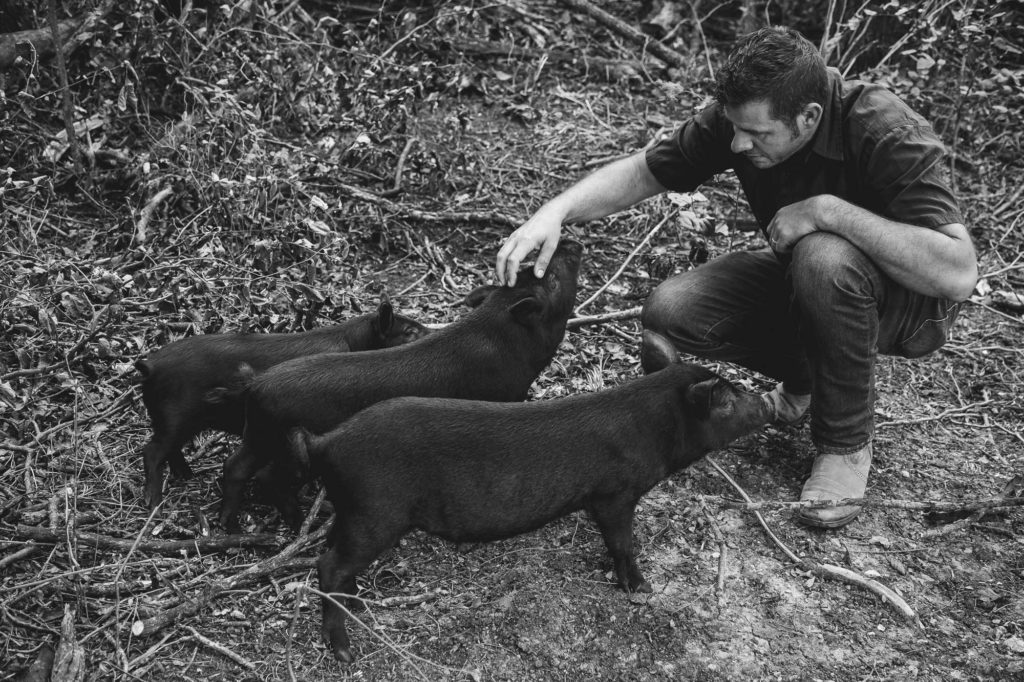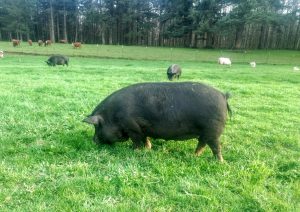Always non-GMO, Always pasture raised!
You will be amazed at the flavor of our Locally Produced pasture raised non-GMO pork! Please contact us if you are interested!

The American Guinea Hog is the ideal sustainable heritage farm pig. It is known for its moderate size, excellent foraging abilities, friendly temperament, excellently flavored meat and indispensable lard. While the American Guinea Hog is smaller than industrial hog breeds, it is a good-sized farm pig providing a nice, well-marbled carcass.
Origin: The American Guinea Hog is a true American heritage breed of domestic farm pig.It is perhaps over 200 years old. They developed as a landrace breed throughout the southeastern states of the
USA. Anecdotal evidence suggests a European ancestry with other possible influences. It has been
determined though genetic testing that the American Guinea Hog is a distinct breed.
Height: Adult American Guinea Hogs (at 2 years of age) range from 22 to 27 inches tall, adult males sometimes averaging one or two inches taller than females. Older animals may grow larger.
Body/Length: Fully grown adult American Guinea Hogs range from 46 to 56 inches, measured from a point between the ears to the base of the tail. They have a straight to slightly arched back. From a side view, they should present a long, rectangular appearance (with flat sides and rounded corners). As a landrace breed, variations are common. Some hogs will be taller and broader at the shoulders with slightly lower and narrower hips.

Weight: Well-conditioned, fully adult American Guinea Hogs range from 150 pounds to 300 pounds, depending on sex, frame-size, and body condition. Because American Guinea Hogs easily fatten, care
should be taken to NOT overfeed, especially with grain. Excess weight will likely lead to fertility problems.
Head/Face/Ears/Tail: American Guinea Hogs have medium-small sized, upright ears (sometimes slight bent at the tips in adults). They have slightly dished faces with snouts that vary from rather short to medium-long. The tail has a single curl. Slightly forward facing eyes are common.
Color: Most American Guinea Hogs are solid black. A common variation due to a widely spread recessive gene, is solid black with minimal white points at the feet and tip of nose. Excess white (beyond the feet and the end of the snout) is discouraged. An extremely rare recessive red gene exists in the breed, and may rarely exhibit.
Hair: Adult American Guinea Hogs typically have medium to long, coarse, bristled, black hair, some tinged in reddish-brown tones or bluish-black tones.
Temperament: The American Guinea Hog is exceptionally calm and friendly making it an excellent choice for small sustainable family farms. They have exceptional mothering skills. Females with piglets are easily managed, as are adult males. They do well with children and a wide range of farm animals. It should be a goal of breeders to maintain the good temperament of the American Guinea Hog.
Living Environment: While American Guinea Hogs are suited to a wide variety of environments and will do better than most breeds on low grade forage, they prefer lush pastures with clover along with access to minerals, kitchen scraps, quality hay in winter, clean water to drink, access to a muddy wallow, minimal shelter from precipitation and wind, dry bedding, and perhaps a small amount of grain. They thrive where ranging and grazing is a constant activity giving them plenty of exercise. They are minimal rooters when good grazing and adequate feed is available.
Life Expectancy: The expected life span of the American Guinea Hog is 10-15 years or until they are ready for culling and slaughter as farm livestock, providing excellent meat for the table.
Carcass: At six months, the American Guinea Hog may provide a nicely marbled carcass of up to 75 pounds hanging weight of gourmet-quality highly-flavored meat. Fat tends to peel easily from the meat. There is no need to castrate young male hogs intended for slaughter at six months of age.